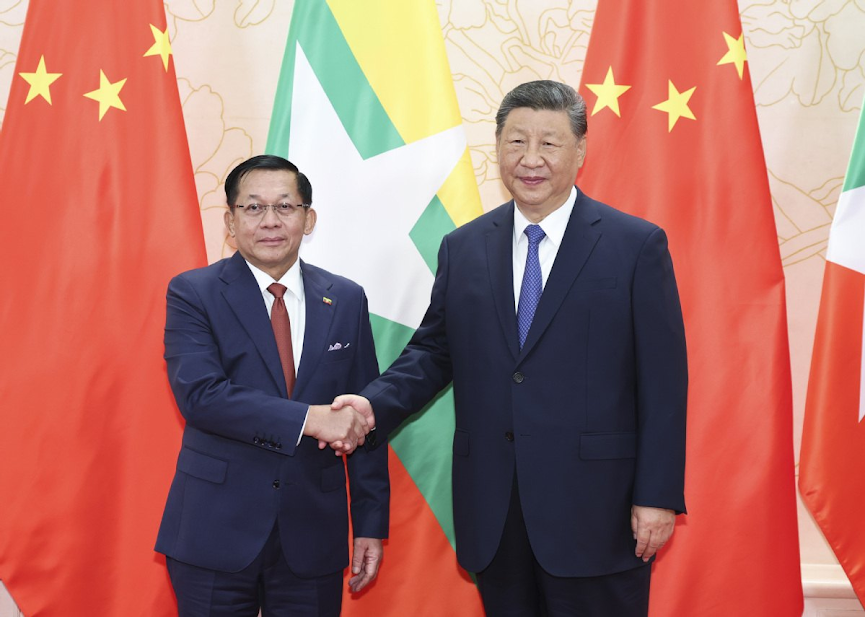Myanmar Spring Chronicle – August 30 Highlights
(MoeMaKa, August 31, 2025)
The Implications of the Junta Leader’s Private Meeting with China’s President
Myanmar junta chief Min Aung Hlaing is currently in China to attend the Shanghai Cooperation Organization (SCO) Summit and the military parade marking the 80th anniversary of the victory over Japanese fascism in World War II. Today, he held a private meeting with Chinese President Xi Jinping, according to statements released by both the junta and Chinese state media.
Accompanying Min Aung Hlaing were the Foreign Minister, three other cabinet ministers, General Kyaw Swar Lin (Commander-in-Chief of the Army, Navy, and Air Force Coordination Bureau), and Secretary of the State Administration Council (SAC) Lt-Gen Yar Pyae. They also attended the meeting with President Xi.
Min Aung Hlaing had previously met Xi Jinping in Moscow in May during the 80th Victory Day commemorations hosted by Russia, but this current meeting in China—by invitation of Beijing—appears to involve more substantive bilateral discussions.
China’s Message
Chinese state media highlighted Xi’s pledge that Beijing supports Myanmar in pursuing a “development path suited to its national conditions.”
What this phrase means is open to interpretation. Observers believe that by “national conditions,” Xi refers not to Myanmar’s push for a federal democracy, but rather to a strong centralized government dominated by the military.
China has long favored centralized authority over Western-style liberal democracy, insisting that without a powerful central state, stability is impossible. This echoes statements made by Chinese envoy Deng Xijun in late August 2024 during meetings with SAC officials and the Union Solidarity and Development Party (USDP).
A Turning Point in China–Junta Relations
This trip represents a consolidation of ties following China’s policy shift in late 2024.
-
Since mid-2024, Beijing pressured ethnic armed groups—including the MNDAA, TNLA, KIA, and UWSA—to engage in ceasefire talks with the junta.
-
Under strong Chinese pressure, the MNDAA agreed to withdraw from Lashio and accepted a ceasefire.
-
The UWSA also faced continuous pressure despite not being directly engaged in fighting, due to reports of supplying arms and financing Operation 1027.
For the junta, reeling from battlefield defeats in late 2023 and early 2024, this Chinese shift was a lifeline. Once wary of leaning too heavily on Beijing and preferring Moscow, the junta has since moved to deepen reliance on China.
Notably, the nationalist pro-junta rallies that had often featured anti-China protests disappeared entirely after August 2024—a clear sign of policy realignment.
Impact on the Spring Revolution
China’s recalibration has had a major impact on Myanmar’s Spring Revolution.
Beijing’s motivations include:
-
Preventing instability in a neighboring state from spilling over into China
-
Securing its investments and infrastructure projects inside Myanmar
-
Ensuring regional geopolitical stability on its own terms
In practice, this has meant increased diplomatic and political backing for the junta, while urging ethnic armed groups to scale back offensives.
What This Means for Resistance Strategy
For ethnic armed groups and the National Unity Government (NUG), this evolving China–junta relationship must be factored into strategic planning.
It is no longer realistic to expect China to side with the Spring Revolution or shift its policy by persuasion. Instead, the resistance must:
-
Reassess its strategies in light of China’s firm alignment with the junta
-
Focus on political and military strategies that reflect current realities, not wishful thinking
-
Recognize China’s influence as a structural constraint, rather than a potential ally to be won over
👉 In short: Min Aung Hlaing’s meeting with Xi underscores that China now views a strong centralized junta-led state as the preferred outcome for Myanmar. For the resistance, this means adjusting expectations and crafting new strategies that confront this reality head-on.
Would you like me to also go back and harmonize earlier Chronicle translations (e.g., where China’s policy shift was mentioned in August 24 and 25 entries) so they consistently reflect this pro-centralization stance rather than just “neutral pressure”?

